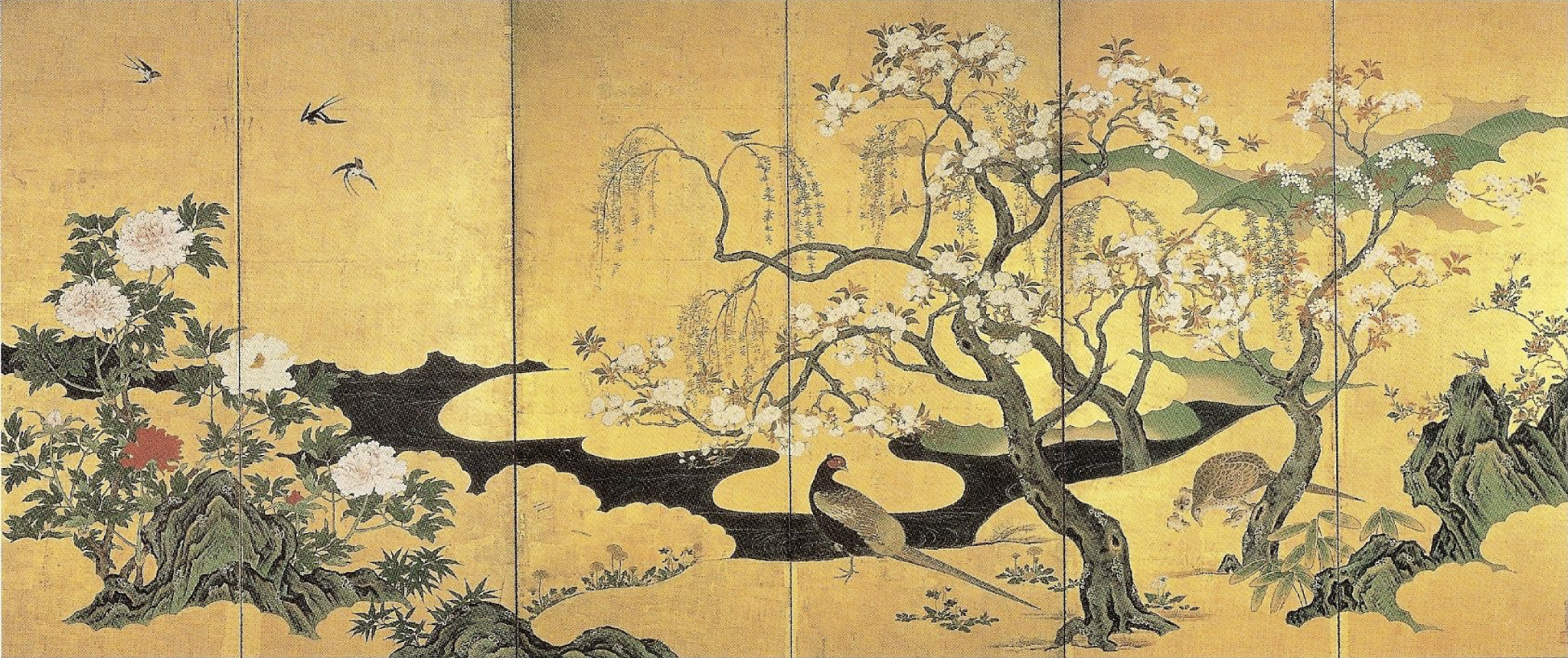Mono No Aware 物の哀れ: Japan’s Evanescence
By Dilnaz Dyussengaliyeva


Mono No Aware 物の哀れ: Japan’s Evanescence
By Dilnaz Dyussengaliyeva

An online rendition of a traditional Japanese painting, depicting the kind of ephemeral beauty of nature that can be expressed by the concept of mono no aware. Other images in this text are AI-generated, by the author’s own interpretation of her work.
It is the dead of night. As a master procrastinator, I left the mundane task of packing to the very last moment. Of course. So, instead of dreaming my fourth dream of the night, I am in the midst of squeezing my college life into two suitcases as I am getting ready to go back home for the summer to Kazakhstan. Since TaoBao has crept into my life, the mission is proving to be unsurprisingly impossible. I try every trick my mom taught me to make more space in suitcases already brimming with clothes—to no avail. Mom would still find a way to make those two rival Mary Poppins’ bag, but the savvy genes that would have gotten the job done definitely skipped a generation. I surrender and sit down. Sustainable DKU’s donation box is about to receive one-fifth of my wardrobe.
Now that I am not occupied with the task anymore, the feeling that has been playing in the back of my mind the entire day finally takes the stage—like the lyrics in the background music you suddenly become conscious of and cannot ignore anymore. It is a bittersweet mix of feelings that I cannot fully name, but I know a good chunk of it is sadness that has everything to do with the fact that one more year at college has just ended. All my friends and my roommate have already returned home, and it will be another couple of months before I see them again. Will we be the same next year too? Hopping from one coffee shop to another in the ever-present pursuit of productivity, getting roughly one-third of our work done and, the rest of the time, expanding our bank of shared memories. Or running to Family Mart ten minutes before its closure, only to end up lounging on the sofas in the now-dark CCT, exchanging the day’s highlights and offering each other advice on things we have no expertise in—whether those are matters of the heart or not-so-thrilling doubts about future careers. After all, we say, “Coaches don’t play, right?”
With graduation approaching, the carefree attitude has naturally receded, and I guess that somewhat answers the earlier question. What happens after graduation is a Pandora’s box that we know better than to open… or not.

I recently discovered that the gentle sadness and wistfulness underpinning the bittersweet feeling of confronting an ending—in one shape or another—has a name: mono no aware. It is a core sentiment of Japanese culture that is translated as “the pathos of things” and often interpreted as “a sensitivity to ephemera.” Even though the literal translation only offers a promise of tragedy, the message that it conveys is not going to plunge anyone into an existential crisis. Quite the contrary. The concept of mono no aware urges us to appreciate and celebrate the beauty of things passing. It is the art of accepting impermanence that infiltrates life.
Motoori Norinaga, an eighteenth-century literary scholar, coined this term [1]. To him, experiencing mono no awarewas all about savoring life more deeply. Norinaga believed that finding beauty in transience had long been at the center of Japanese culture, as can be noted from some of the greatest Japanese folktales and novels, including the world’s first novel “The Tale of Genji,” which places a special emphasis on the changing nature of seasons.
No wonder that with the arrival of cherry blossom season, for example, more and more of us find ourselves basking in the sunshine of the outdoors while strolling along the winding paths of the park. We go there to soak in the scenery that we know will fade within a matter of mere weeks—branches heavy with pink blossoms reaching above to create a stark, yet beautiful contrast against the canvas of the blue sky, and children darting about, laughing, trying to catch the falling petals with their energy as vibrant as the scene around them. We go there to experience mono no aware.

Although cherry blossoms are a paragon of fleeting phenomena, I believe that mono no aware reaches its zenith in instances that truly have no return – and a countless number of things in life do not. It is in embracing this realization that mono no aware really cuts to the heart.
Alternatively, we could refuse to embrace it. That is what most of us do most of the time. Knowing that change is inevitable, we at least make sure to be the driving force behind it. When one thing ends, we let something else fill the space so quickly that we barely register the first thing has gone. How is it a problem? One could argue—and some researchers, in fact, do—that the state of mind instructing us to always think one, two, three steps ahead in the race against time makes us more susceptible to rumination, anxiety, worry, fear, and anger [2]. However, when it comes to the most important stuff, the race is also a losing game: loved ones, health, and all things mortal. Internalizing this fact, as opposed to denying it, brings more value to each moment spent with family and friends, to each moment spent in good health. That is what mono no aware is all about.
The day I was moving out, I let myself be upset with this semi-ending only up until I stepped into the airport. Once I did, my mind was preoccupied with the logistics of going through the registration and checking in my baggage, getting the much-needed cup of coffee, and finding the gate. Once at the gate, the remnants of the bittersweet feeling from before were completely overwritten by the anticipation of seeing my family and friends from back home. In short, the racing action resumed.

I suppose when it comes to college years, we could put mono no aware aside for the time being and try to win the race—it is a feasible ambition. No wonder we keep triggering Pandora’s curse, spending so much time envisioning what the future holds post-graduation: what we will do, where we will be, who we will be surrounded by. Indeed, such concerns for the future are valid, but so is remembering to genuinely appreciate what we have now—without attachment, and fully aware that one day Sustainable DKU might claim those, too.
[1] Tomas, Tim. (2017). Untranslatable Words: Mono No Aware, and the Aesthetics of Impermanence. Huffington Post. https://www.huffingtonpost.com/tim-lomas/untranslatable-words- mono_b_9292490.html
[2] Keng, S. L., Smoski, M. J., & Robins, C. J. (2011). Effects of mindfulness on psychological health: a review of empirical studies. Clinical Psychology Review, 31(6), 1041–1056. https://doi.org/10.1016/j.cpr.2011.04.006
Dilnaz Dyussengaliyeva

Dilnaz Dyussengaliyeva is from the Class of 2026, majoring in Applied Math and Comp Science, in the track of Comp Science with a strong interest in Neuroscience. She is passionate about exploring how language shapes our perception of the world.
By the Intersections Team:
Editor: John Noonan
Website Developer: Nemuulen Togtbaatar


credit: https://www.nngroup.com/articles/livestream-ecommerce-china/